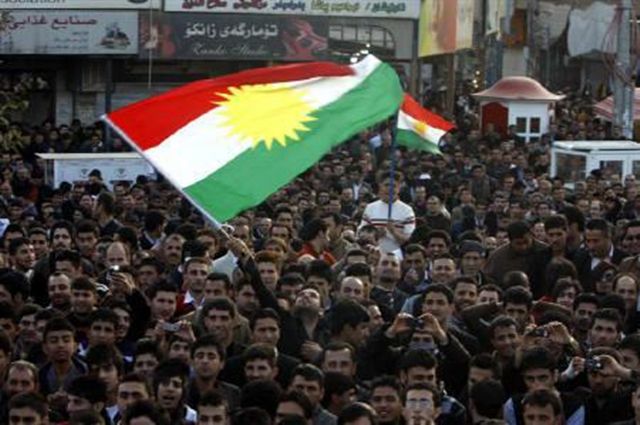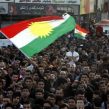
New Tensions in Kirkuk as Kurdish Peshmerga Surround City
Publication: Terrorism Monitor Volume: 9 Issue: 13
By:

The demonstrations occurring in several countries in the Middle East are now also taking place in Iraq. The violence and public protests that erupted in Kirkuk province and elsewhere in Iraq on February 25 have the dangerous potential to escalate into a civil war between Baghdad and the Kurdistan Regional Government (KRG) (Kurd Net, March 2). Given the current divisions between resident Kurds, Arabs, Turkomans and Christians in the disputed city of Kirkuk, the real surprise is that violence in Kirkuk has not yet erupted (see Terrorism Focus, February 25, 2009).
Since 2009, the relationship between Baghdad and the KRG has been “characterized by suspicion, animosity and brinkmanship” that “threaten the stability of the [Iraqi] state at a far deeper political level.” [1] As the Baghdad government of Nuri al-Maliki grew in strength and confidence, it naturally sought to reassert its authority over the northern Kurdish part of the country. The 2005 constitution that guaranteed real federalism, and thus semi-independence for the KRG, is now challenged as having been imposed at a moment of state weakness. Many (but not all) Shiite and Sunni Arabs now seek to return to what they see as the rightful situation of a more centralized state, though this will require altering the constitution. Given the inherent demographics and overall assets of the two sides, there is a sense that time is on Baghdad’s side. The inability to form a new government for more than nine months after the national elections of March 7, 2010, only postponed this situation. As the new al-Maliki government takes hold in 2011, however, the Arab position relative to the Kurds will continue to strengthen.
For the past three years, al-Maliki and KRG president Massoud Barzani have been locked in a bitter on again-off again verbal struggle over the situation. During a tense meeting in Baghdad in November 2008, for example, Barzani told al-Maliki, “you smell like a dictator” (The Economist, November 27). In August 2008, this type of semantic fireworks nearly resulted in open hostilities over the disputed city of Khanaqin in Diyala province, some 90 miles north of Baghdad on the de facto internal border often referred to as the “trigger line.” Here the Kurdish peshmerga (militia) ignored an ultimatum by the Iraqi Security Forces (ISF) to withdraw within 24 hours. After some very tense brinkmanship, the two sides each withdrew some 15 miles north and south of the city, leaving security within Khanaqin to be handled by the police (see Terrorism Focus, September 18, 2008).
The two sides have come close to fighting on several subsequent occasions. Only the presence of U.S. troops stationed nearby prevented bloodshed. Since late January 2010, former U.S. commander in Iraq General Ray Odierno and his successor General Lloyd Austin have been trying to build trust between the two sides by using them in joint patrols (called combined security mechanisms) and to man checkpoints together. Some 450 peshmerga are involved in these joint patrols working in the three provinces of Diyala, Kirkuk, and Nineveh, though KRG leaders have expressed concern such efforts to build confidence will prove insufficient once U.S. forces leave (The Economist, February 11).
Oil-rich and strategically located, Kirkuk represents the center of these KRG-Baghdad tensions. It is “a classic divided city… over which people are prepared to fight and die… The numbers of actors involved, resource dimensions, and international involvement add… layers of complexity that are matched by few other disputes over territorial ‘ownership.’” [2] From an initial Kurdish position of strength in which the KRG appeared ready to take control of Kirkuk under the provisions of Article 140 of the 2005 Iraqi constitution, the contested city and province now seem the proverbial bridge too far for the Kurds.
On February 25, Arabs and Turkomans planned to protest in Kirkuk against corruption and unemployment. The Kurds believed that these protests would lead to attacks against them and sought to preempt the protests. Therefore, two days earlier, Dr. Najmaldin O. Karim, until recently a prominent spokesman for the Kurds in the United States and now a member of Iraqi parliament from the Kirkuk region, told a press conference in Baghdad that “[Arab] chauvinists were planning to destabilize Kirkuk during the protests” (Kurd Net, March 3). Khalid Shwani, another Kurdish MP from Kirkuk, claimed that the Arab Political Council planned to attack numerous Kurdish administrative and security offices. The following day 8500 to 12,000 heavily-armed peshmerga, including crack units of the Zeravani (paramilitary police), were deployed just west of Kirkuk. The Arab Political Council and Turkoman Front denounced the Kurdish move and demanded its immediate withdrawal. A call for a “day of wrath” to protest the peshmerga presence was only averted by a police-enforced curfew.
On March 3, Iraqi prime minister Nuri al-Maliki demanded through a spokesman that the KRG withdraw its troops: “These troops were deployed without the permission of the central government and the Prime Minister has asked them to draw down immediately” (Kurd Net, March 4). However, Shaykh Ja’afar Mustafa, the Minister of Peshmerga Affairs, announced that the Kurdish forces would not withdraw until the situation normalized (Kurd Net, March 9). He claimed that the Kurds had to protect Kirkuk from al-Qaeda, Arab groups, and Ba’athists and were acting on the basis of intelligence reports that indicated that these groups had been planning to take over the city during the protests (Kurd Net, March 9). Mustafa also asserted that the Kurds were coordinating their actions with the Iraqi army units in the region (Kurd Net, March 2).
The Kurdish military reaction raised fears among Arab and Turkomans residents of Kirkuk that the Kurds were seeking to implement Article 140 by force. Indeed Amjad Shakali, a Kurdish nationalist author who has written regularly about Kirkuk, declared: “Sending Kurdish troops to the disputed areas is a very good thing and a great victory. That step should have been taken in 2003” (Kurd Net, March 2).
A new international dimension of the crisis developed on March 6 when Turkish deputy foreign minister Fereydun Sinirlioglu arrived in the KRG capital of Irbil and met with KRG president Massoud Barzani. Turkey has long seen itself as the protector of its Turkoman kinsmen in Kirkuk and opposed KRG annexation of Kirkuk as a dangerous move that might inflame its own restless Kurdish population and the continuing insurgency waged by the Kurdistan Workers Party (PKK). In no uncertain terms, Sinirlioglu urged the Kurds to pull their troops back (Kurd Net, March 9). Given the upcoming Turkish national elections scheduled for June 12, Turkish prime minister Recep Tayyip Erdogan had to be seen by his countrymen as playing a strong nationalist hand on the Kirkuk issue. However, Jabbar Yawar, the KRG undersecretary to the Ministry of Peshmerga Affairs, replied: “This issue is no business of the Turkish government” (Kurd Net, March 9).
Ayad Allawi—who represents the Iraqi Sunnis (including Kirkuk’s Arabs and Turkomans) and last year lost a closely contested election to al-Maliki — declared through his spokesman that although the deployment of the Kurdish forces was “normal . . . the mobilization of those forces without an order from Maliki is illegal because he is the commander in chief of the armed forces in Iraq” (Kurd Net, March 2). Ahmed al-Obeidi, an Arab politician in Kirkuk, suggested that the KRG deployment of troops was a way to deflect attention from the ongoing protests against it by its own citizens in Sulaymaniya. [3] If so, it would not have been the first time in history that a government in trouble domestically had sought to unite its people on an external adventure.
The results from the most recent Iraqi elections held on March 7, 2010 were somewhat disappointing for the Kurds as they showed Kirkuk evenly divided between them and the city’s Arabs and Turkomans. Such demographics would seem to make it even less likely that Kirkuk might be annexed to the KRG. Arabs have accused the United States of favoring the Kurds in the latest Kirkuki imbroglio, but in truth the scheduled U.S. troop withdrawal by the end of 2011 probably invites further tensions over Kirkuk as the U.S. mediator stands down. (Kurd Net, March 3). Fortunately, the worst predictions for Kirkuk have not yet been realized, but whether or not the parties involved can avoid an outbreak of ethnic and sectarian violence in these conditions remains uncertain.
Notes:
1. For a lucid analysis, see Gareth Stansfield and Liam Anderson, “Kurds in Iraq: The Struggle between Baghdad and Erbil,” Middle East Policy 16 (Spring 2009), pp. 134-45.
2. Liam Anderson and Gareth Stansfield, Crisis in Kirkuk: The Ethnopolitics of Conflict and Compromise, University of Pennsylvania Press, 2009, p. 9.
3. On these events, see Kamal Chomani and Jake Hess, “Pro-Democracy Demonstrations in Northern Iraq/South Kurdistan,” March 2, 2011. https://www.mesop.de/2011/03/02/pro-democracy and Michael Rubin, “Saddam in Kurdistan,” Commentary Magazine, February 23, 2011.





